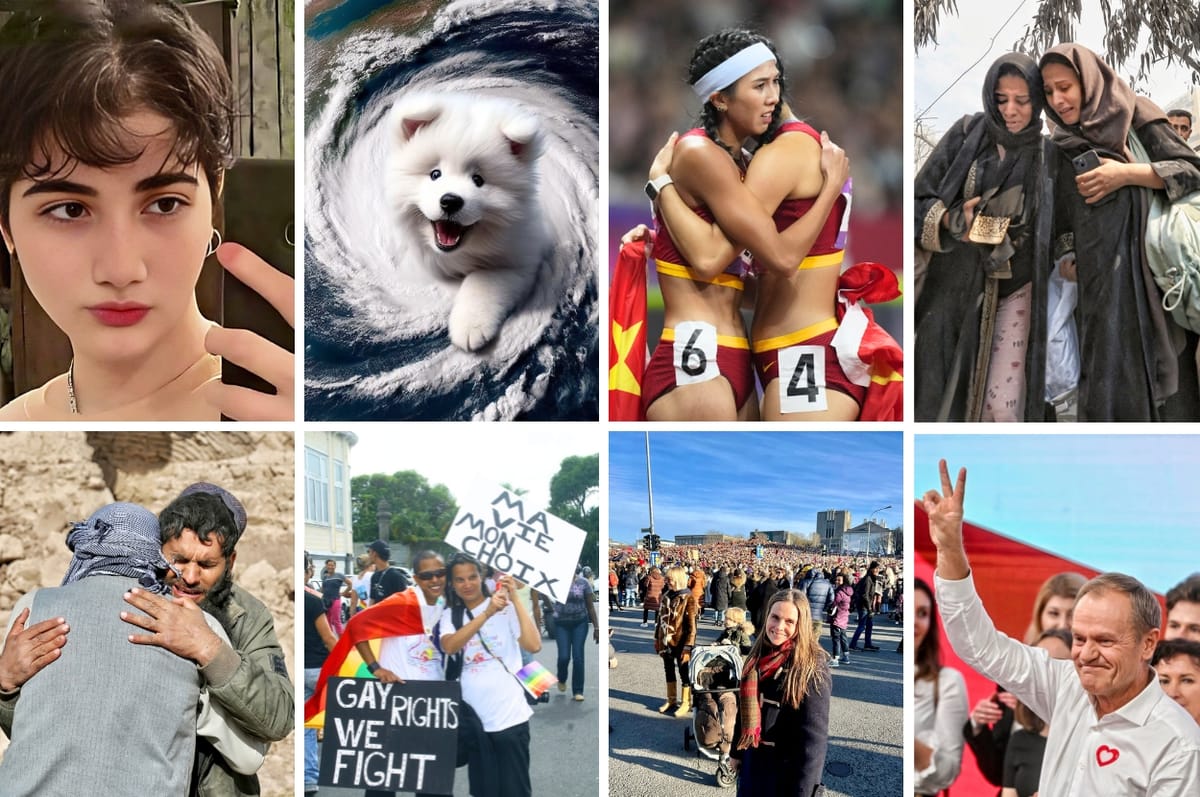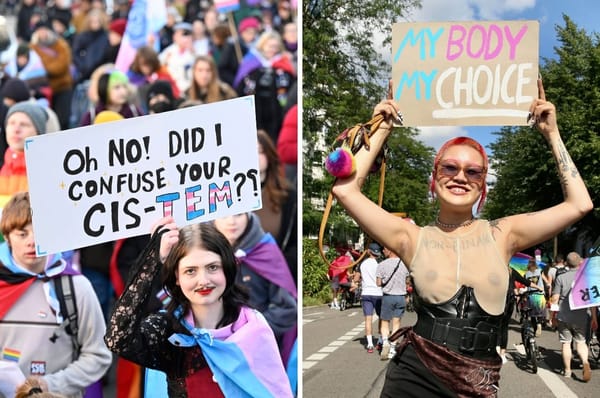Here’s What Happened Around The World In October 2023
Take a look back at some of the biggest stories that you may have missed in October 2023.

Take a look back at some of the biggest stories that you may have missed in October 2023.
1. War erupted between Israel and Palestinian militant group Hamas
The fighting erupted on Saturday Oct. 7 when Hamas fired thousands of rockets and invaded southern Israel in a surprise attack.
Experts say Hamas carried out the unprecedented attack in order to liberate Palestinian prisoners held by Israel, Vox reported.
Hamas fighters killed about 1,200 Israelis and are holding another about 242 people hostage.
In response, Israeli prime minister Benjamin Netanyahu declared war on Hamas and mobilized Israeli military forces.
Israel launched massive airstrikes into Gaza, which has killed more than 12,000 Palestinians.
2. The 16-year-old Iranian girl who was allegedly beaten into a coma by “morality police” has died
The 16-year-old Iranian teen who was allegedly beaten into a coma by “morality” police died.
Iranian state media reported that Armita Geravand died on Saturday Oct. 28 after she was pronounced brain dead a week earlier.
CCTV footage on Sunday Oct. 1 showed a group of girls entering a subway train in Tehran, with some girls not appearing to be wearing headscarves.
After they enter the carriage, one of the girls is seen immediately backing off and reaching for the ground.
Moments later, Geravand is seen being carried off the train, unconscious, by other passengers.
No video footage showed what happened inside the train, but Human Rights group Hengaw said that Geravand was subjected to “a severe physical assault” by the so-called “morality” police.
The government’s official media said that Geravand had fainted due to low blood pressure.
3. These two Chinese athletes hugged each other after a race and got censored over Tiananmen Square
Chinese authorities censored a photo capturing two women Chinese athletes hugging each other after a race over an accidental reference to the Tiananmen Square Massacre.
Lin Yuwei, 24, and Wu Yanni, 26, who both competed in the women’s 100-meter hurdles final at the Asian Games in Hangzhou, China, on Sunday, October 1, embraced each other after Lin won Gold.
In the photo that has since mostly been taken off on Weibo, one of China’s largest social media platforms, the women both wore stickers showing their lane numbers – 6 for Lin and 4 for Wu – forming the numbers “64”, turning their celebratory moment into a controversial situation.
The number “64” is a common reference to the Tiananmen Square Massacre in Beijing which happened on June 4, 1989.
During the massacre, Chinese government troops armed with assault rifles and tanks killed thousands of student-led pro-democracy demonstrators.
The incident is strictly censored in the mainland; any vague or unintentional references are removed from the internet, and anyone who openly commemorates the incident is subject to arrest.
4. Gay sex is no longer a crime in Mauritius
In a historic moment, Mauritius Supreme Court has ruled that criminalizing same-sex acts is unconstitutional.
In Mauritius, a British colonial-era law criminalized anal intercourse between gay men with up to five years in prison.
On Wednesday Oct. 4, the court determined the law breached people’s rights to freedom of expression, privacy, and liberty, ending the 185 years colonial law.
The case was brought forward by activist Abdool Ridwan (Ryan) Firaas Ah Seek in 2019.
LGBTQ rights organization, Human Dignity Trust , said there is no record of the law being enforced for years, but the existence of it marginalizes and discriminates LGBTQ people.
5. Japan’s top court ruled that forcing people to be sterilized to change gender is unconstitutional
In a step forward for LGBTQ rights, Japan’s top court ruled that forcing people to be sterilized to change gender is unconstitutional.
Currently, Japan requires people to have their reproductive organs removed before they can legally change their gender.
They must also meet several other conditions including being diagnosed with gender dysphoria by two doctors, undergoing transition surgery, being older than 18, not married and not have any children under 18.
The requirements have been widely criticized by human rights and medical groups.
On Wednesday Oct. 25, Japan’s supreme court unanimously ruled that the sterilization requirement violates the country’s constitution.
The verdict comes after a trans woman brought forward a case when she was unable to change her gender from the biologically assigned male to female in her family registry.
The court ruled that the requirement “restricted her freedom not to harm herself against her will.”
The government must now follow up and amend the law, according to Human Rights Watch.
However, the court did not rule on the requirement for transition surgery, instead sending it back to a lower court for further consideration.
6. India’s top court refused to legalize same-sex marriage
In a historic ruling on Tuesday, Oct. 17, India’s Supreme Court announced that it cannot grant marital rights to same-sex couples, including benefits such as adoption, insurance and inheritance.
The Chief Justice of India and four other justices, after hearing 21 petitions between April and May 2023, made the decision to decline appeals to legalize same-sex marriages, stating that the responsibility to legislate on this matter falls under the country’s parliament.
Ultimately, it came as a 3:2 majority verdict to reject changes to adoption and civil union laws, according to the BBC.
However, the Chief Justice argued that the government should ensure that benefits enjoyed by heterosexual couples should also extend to unmarried same-sex couples in a union.
The court instead approved a government proposal to establish a committee to review laws that currently deny the LGBTQ community “compensatory benefits or social welfare entitlements”, according to CNN.
7. People in Australia voted to reject including indigenous people in its constitution in a referendum
People in Australia have voted to reject including Indigenous people in its constitution in a referendum.
Currently, Australia’s constitution does not include any mention of Indigenous Australians, who have occupied the country for at least 65,000 years.
Indigenous Australians make up about 3.2% of Australia’s population but historically have been marginalized.
In June, the government announced that it would finally hold a referendum on altering its constitution to include Indigenous people.
Named “The Voice,” it asked Australians if they agree to create a committee of Indigenous representatives to advise on government policies that affect Indigenous people.
The referendum on Saturday Oct. 14 required the support of more than half eligible voters to pass.
But with almost 70% of the vote counted, the “No” vote led the “Yes vote” with 60% to 40%.
Prime Minister Anthony Albanese, who had supported the “Yes” vote, said it was not the result he had hoped for but that the moment of disagreement does not define nor divide Australia.
He added that it was not the end of the road to reconciliation with Indigenous people and that the country would have to find a new way forward.
8. A magnitude 6.3 earthquake struck Afghanistan and more than 2,000 people are dead
More than 2,000 people have been killed after a magnitude 6.3 earthquake struck Afghanistan, the Taliban government said on Sunday Oct. 8.
If the death toll is confirmed, it would be one of the deadliest earthquakes to hit Afghanistan in 20 years.
The earthquake struck on Saturday Oct. 7, with an epicenter about 35 kilometers northwest of the city of Herat.
It was followed by multiple strong aftershocks.
The quakes flattened entire villages and crumbled buildings, trapping people underneath, as others tried to dig out survivors with their hands.
The United Nations said on Sunday evening that 1,023 people had been reported killed, although the Taliban gave a higher number.
Taliban officials also said an additional 1,240 people were injured and 1,320 houses were completely destroyed.
A Taliban spokesperson said the country was in urgent need of aid such as tents, as well as medical and food times.
9. People In Poland voted out the right-wing government after eight years
People in Poland have voted out the right-wing government after eight years.
Since it came to power in 2015, the ruling Law and Justice party has eroded democracy and attacked human rights by taking away the independence of the country’s top court.
The government has now banned abortion in almost all cases and supported more than 90 regions in becoming “LGBT-free” zones – areas that are unwelcoming of “LGBTQ ideology”.
Since 2015, numerous protests have broken out against the various rulings and changes.
Just in June, hundreds of thousands of people took to the streets of Warsaw in a huge, unprecedented protest against the government.
And on Oct. 15, a record 74% of voters turned out to vote in the elections.
Although the Law and Justice party still received the most votes at 35%, it is unlikely to find a coalition partner and form a government.
Meanwhile, the three main center-left opposition groups won 54% of the votes together – enough to form a government.
Turnout among young people aged between 18 and 29 reached 69%, a massive jump from 46% in the previous elections in 2019.
The opposition groups, led by former prime minister and European Council president Donald Tusk, have now requested the president allow them to form a government.
10. A huge bedbug outbreak swept over Paris and people are freaking out
A bedbug outbreak swept over France, causing panic among city residents and putting pressure on the government before the 2024 Summer Olympic Games in Paris
Reports of bedbugs sightings on public transportation, cinemas and hospitals have soared in the past few weeks in France, in particular in Paris, the most-visited city in the world in 2022.
They even caused a school shutdown in Paris.
Reports of the outbreak started a few weeks ago and coincided with Paris Fashion Week, causing panic and jokes that celebrities and influencers would bring the bedbugs home with them overseas.
Bedbugs are common in cities and are found living in mattresses, carpets, clothing and linens.
They feed on human blood but don’t transmit diseases, with bites causing itchiness, redness and swelling.
Experts say the recent resurgence may be due to the growth in international tourism after the world opened up after COVID.
The outbreak is putting pressure on the French government as Paris will host the 2024 Summer Olympics in less than a year.
However, France’s transport minister said all the bedbug cases on public transport turned out to be false alarms and called on the public not to “succumb to psychosis”.
11. Women in Iceland, including the prime minister, skipped work to protest the gender Wage gap
Thousands of Icelandic women staged the country’s first full-day women’s strike in 48 years to protest against gender pay gap and gender-based violence on Tuesday, Oct. 24, with Prime Minster Katrín Jakobsdóttir joining them.
Jakobsdóttir postponed a cabinet meeting her official duties for the day, with the woman employees that make up two-thirds of the cabinet staff following suit, according to officials.
Some schools closed for the day, many medical clinics were only attending to emergencies, and only one bank branch remained open during the walkout, according to local news media.
Under the slogan “Do you call this equality?”, the nationwide walkout marks the seventh women’s strike and the first full-day event in Iceland since 1975, when about 90% of the country’s women workforce refused to work to raise awareness about women’s crucial economic role in society.
Iceland has long been recognized as one of the most progressive countries in terms of gender equality, ranking first in the World Economic Forum Gender Gap report for 14 consecutive years.
However, workplace inequality persists as women in certain industries continue to earn at least 20% less than men in Iceland, according to Statistics Iceland.
12. People in Sweden held a “ugliest lawn” contest to help conserve water
The Swedish Island of Gotland has held its second annual “ugliest lawn” contest to conserve limited water resources.
To win the contest, people compete for the “ugliest” lawn, which means the brownest, driest lawn.
Residents are encouraged to avoid watering their lawns for an entire season and then share photos of their dry lawns on social media to win.
The idea of the contest came after the country implemented an irrigation ban in 2022 to help conserve water during summer.
It is aimed at making people aware of the water shortage on the island and changing the norms of having green, well-kept lawns.
Gotland, which is Sweden’s biggest island, frequently experiences drought and water scarcity.
The competition helped reduce household water consumption by 5% last year, according to the Gotland’s official website.
13. A typhoon named “Puppy” in Japanese hit Taiwan and people turned it into a huge meme
A typhoon named “puppy” in Japanese hit Taiwan, and people couldn’t resist turning it into a huge meme.
Typhoon Koinu – “puppy” in Japanese – made landfall in southern Taiwan on Thursday Oct. 5, lashing it with heavy rain and recording-breaking winds of up to 119 kilometer per hour.
Inspired by the name, people in Taiwan started putting their Photoshop skills to good use.
Taiwan’s Ministry of the Interior posted a meme on its Facebook page, showing Typhoon Koinu as a chihuahua – the smallest but one of the most aggressive dog breeds – as part of a warning.
People then started creating AI-generated memes of the typhoon as cute, white-furred dogs.
Some also shared photos of their dogs in contrasting situations, such as before and after a meal, to depict the huge differences in the typhoon’s name and the scale of damage it caused.
Authorities said the typhoon killed one person and injured more than 300 others.




